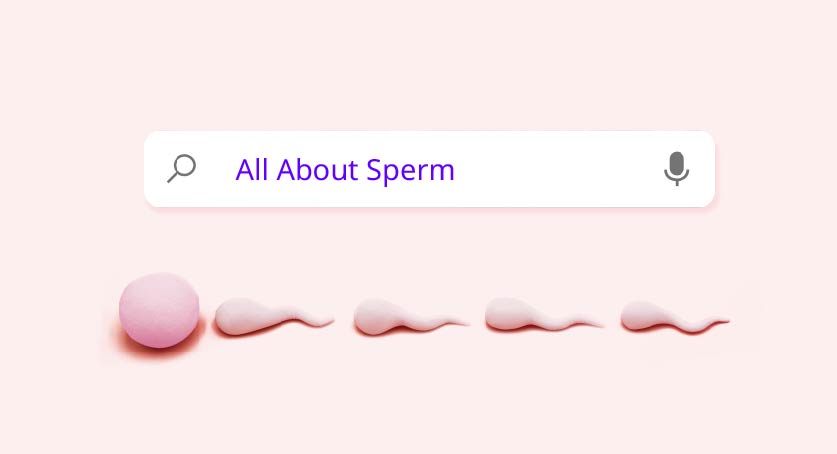

What is it?
The male reproductive gamete sperm or ‘spermatozoa’, consists of a fluid mixture of water, plasma and mucus released upon male ejaculation. An essential ingredient for biological reproduction, sperm is created and stored in the testicles. The integrity of sperm DNA is essential for healthy embryo development so semen evaluation is crucial before embarking on a fertility journey of any kind. When analyzing the quality of ejaculate, experts are looking at two main factors: production and delivery. Common issues affecting sperm viability include: halted development, limited quantity, irregular formation, or absence altogether (azoospermia). Although not as dramatically, sperm can decrease and decline due to age, lifestyle choices, medication, and diet similar to oocytes (eggs) from the female reproductive side. Today, thanks to ART (assisted reproductive technology) prospective parents have the option of a genetic link with their child not offered through parentage via adoption. A typical gestational carrier will have no genetic link to the foetus she is carrying; gametes typically are derived by intended parents or with the help of an egg or sperm donor.
Preparing for sperm deposit
Prior to leaving a sample for your sperm analysis, your surrogacy coordinator
should provide you with some helpful instructions to boost your chances for a
healthy and successful deposit.
Timed Abstinence
The ‘abstinence period’ is a suggested timeframe in which ejaculation should be avoided prior to sample-leaving. This means refraining from any sexual activity (no ejaculation of any kind including masturbation) for at least two days, but not more than five to seven days before your sample is collected. Abstaining for a longer or shorter period can result in decreased sperm motility and lower quantity. Samples gathered after two days of abstinence usually have the highest numbers of motile sperm. Saving up as much sperm as possible for the big day might seem like a good idea, but waiting too long for ejaculation can actually hinder success. Older sperm begins to die if ejaculation is too infrequent, decreasing the percentage of live sperm. A significant impact has been noted on the quality (shape and movement) of sperm after 7 days of abstinence.
Unhealthy Habits
Smoking, alcohol, caffeine and narcotics, should be avoided at least 10 days prior to leaving your sperm sample. Hot tub bathing, saunas and excessive sun should also be avoided. For now, while studies are unclear, it’s also a good idea to notify your coordinator if you have been infected by Covid 19 within 3 months of your deposit date.
Specific ingestables that could affect the quality of your sperm sample include
medication such as:
• Cimetidine (Tagamet)
• Male and female hormones (Testosterone, Estrogen)
• Sulfasalazine
• Nitrofurantoin
• Anabolic steroids
• Certain chemotherapy medication
• Herbal medicines (St. John’s Wort and high doses of Echinacea
Do’s and Don’ts
Great hygiene
Show up freshly showered, ensuring hands and penis are clean.
Keep it simple
No lubricant, including saliva, should be used, unless requested and provided by your IVF clinic.
Sterile and Sanitary
Most clinics will insist you leave your deposit alone. As helpful as it might be to have your partner with you, more is not merrier in this instance as contamination increases two-fold.
Ejaculation should be directed only into the sterile cup provided to you and not a condom or any other vessel. Touching the inside of the container should be avoided; try your best to ensure the first fluid expressed from your ejaculation makes it into the cup, as it this is the most sperm-rich. Semen spillage might happen but no need to scoop it up and add it to your cup as purity is more important than amount.
Seal it up
Once your sample has been collected, seal your cup lid and ensure your name and the date of your sample is correctly recorded on your vessel.
Don’t stress and take your time
It is completely normal to feel awkward when leaving a sperm deposit for the first time. Normally private, ejaculating under sterile and controlled conditions, while being acutely aware of the clock ticking and the medical team right outside the door can be stressful and impede successful collection. It’s important to remember that this is a clinical procedure – no different to a pap smear or prostate check. Your personal coordinator and clinic staff are objective professionals, have handled thousands of sperm analyses before you and have got this down to a science.
Fresh VS. Frozen
Studies show no difference in implantation and pregnancy rates between fresh and frozen sperm (unlike oocytes); both are as effective for ICSI. Opting for a frozen sample brings ease to family building and the opportunity for single women and same-sex couples to build their family at a more convenient time.